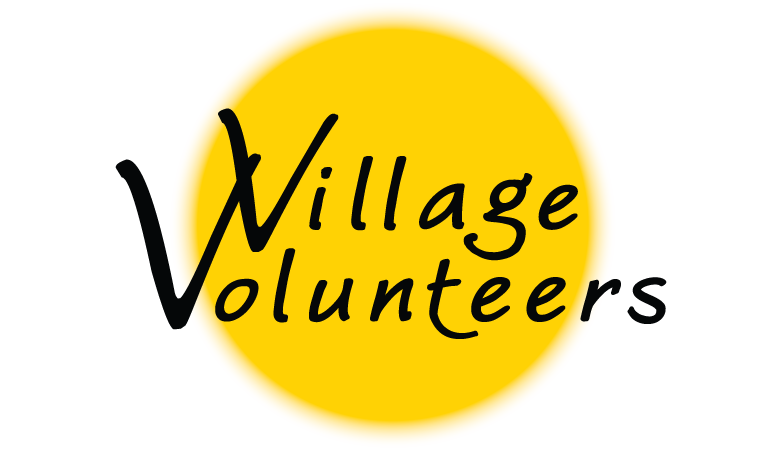Kenya: Common Ground for Africa
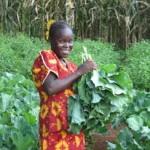 Common Ground for Africa has several programs that effectively work to mitigate poverty by providing people with skills, training, and knowledge necessary to improve their well-being and social stability. As a volunteer, you’ll have incredible opportunities that include: education at Pathfinder Academy, the extraordinary Lenana Girls School, environmental conservation, public health including clean water awareness at the ceramic water filter facility, building, working with women in business and organic farming.
Common Ground for Africa has several programs that effectively work to mitigate poverty by providing people with skills, training, and knowledge necessary to improve their well-being and social stability. As a volunteer, you’ll have incredible opportunities that include: education at Pathfinder Academy, the extraordinary Lenana Girls School, environmental conservation, public health including clean water awareness at the ceramic water filter facility, building, working with women in business and organic farming.
We love helping volunteers find their perfect placement. Fill out our Interest Form to get started!
Explore more programs in Kenya, Ghana, India, and Nepal.
PROGRAM OVERVIEW
Common Ground is a community-based organization in Kitale, Kenya. Its mission is to alleviate poverty – the single largest threat to human well-being and social stability in Kenya –while also conserving the Earth’s natural resources and biodiversity. Common Ground strives to demonstrate, in a concrete, observable way, that modern human societies can live sustainably and comfortably with nature.
Common Ground works with communities to:
- increase the capacity of existing technologies and resources
- strengthen local institutions
- use participatory methodologies
- bring in expertise to focus on the needs of the community
- promote gender-equality practices and lifestyles
- increase sustainable, income generating programs
- environmental protection and public health awareness including HIV/AIDS and water health
- implement childhood education and protection programs
Common Ground established Pathfinder Academy, a primary school with over 400 students in grades 1-8, most of whom are orphans and vulnerable children. Each year, students and faculty visit groups, such as the AIDS widows, to teach them bio-intensive growing methods so that they can become self-reliant and attain food security. The school has consistently received awards from the Ministry of Education for being the best school in reaching out to communities. Experiences gained at Pathfinder Academy have been shared through local medical and international forums, and are being replicated in other countries.
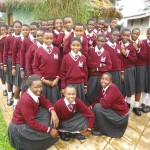 Lenana Girl’s High School – The mission is to give orphaned and dispossessed girls (due to unwanted pregnancies, forced female genital mutilation (FGM) and forced early marriage) an opportunity to attain a quality secondary education. These promising young women from underprivileged backgrounds receive access to high-quality education, personalized mentoring, and rigorous leadership development. The school is unique because it’s designed to overcome the problems of under-funding, economic exclusion, and poor quality, irrelevant education which afflict so many traditional schools in Kenya. The Lenana Girls High School gives students the opportunity to learn practical and entrepreneurial skills as they help run the school’s commercially viable, on-campus enterprises. By learning to run competitive enterprises – from production to marketing to record keeping – students acquire useful, marketable skills. At the same time, the school will ensure the affordability of this education to those who cannot afford to go to high school by generating enough income to cover all of its operating costs. The school teaches students to develop the technical, analytical and personal competencies they will need in the workplace. The school will achieve this by integrating the teaching of traditional high school subjects with the running of its small-scale, on campus enterprises and using the ‘Learning by Doing and Earning’ methodology. It teaches students to analyze market demand and base production decisions on consumer demand, looks for attractive market niches where their products can fetch higher prices, and to produce goods and services with as much ‘’value-added’ as possible. Common Ground is also home of the Kenya Ceramic Water Filter Facility that locally makes water filters and educates the community on safe water practices. Below are more links to the blogs for Lenana girls.
Lenana Girl’s High School – The mission is to give orphaned and dispossessed girls (due to unwanted pregnancies, forced female genital mutilation (FGM) and forced early marriage) an opportunity to attain a quality secondary education. These promising young women from underprivileged backgrounds receive access to high-quality education, personalized mentoring, and rigorous leadership development. The school is unique because it’s designed to overcome the problems of under-funding, economic exclusion, and poor quality, irrelevant education which afflict so many traditional schools in Kenya. The Lenana Girls High School gives students the opportunity to learn practical and entrepreneurial skills as they help run the school’s commercially viable, on-campus enterprises. By learning to run competitive enterprises – from production to marketing to record keeping – students acquire useful, marketable skills. At the same time, the school will ensure the affordability of this education to those who cannot afford to go to high school by generating enough income to cover all of its operating costs. The school teaches students to develop the technical, analytical and personal competencies they will need in the workplace. The school will achieve this by integrating the teaching of traditional high school subjects with the running of its small-scale, on campus enterprises and using the ‘Learning by Doing and Earning’ methodology. It teaches students to analyze market demand and base production decisions on consumer demand, looks for attractive market niches where their products can fetch higher prices, and to produce goods and services with as much ‘’value-added’ as possible. Common Ground is also home of the Kenya Ceramic Water Filter Facility that locally makes water filters and educates the community on safe water practices. Below are more links to the blogs for Lenana girls.
- Goat Dairy Project
- Science center at Lenana High school
-
Lenana Girls’ High School: A Critical & Effective Response To A Multi problem
- Lenana girls are helping other women.
- Life before Lenana.
COMMON GROUND GOALS
- Provide humanitarian support to communities in need through a portfolio of development projects, which are planned and implemented cooperatively.
- Provide assistance in situations of crisis or chronic distress and work towards the development of long-term solutions with those affected.
- Establish equitable partnerships with those in need to achieve positive and sustainable change in communities.
- Establish networks that develop indigenous capacity, appropriate technology, and skills at all levels.
- Develop and maintain relationships with our partners, which provide effective channels for mutual growth and action.
- Expand and promote the fair and equitable involvement of women in the development process.
- Lobby, advocate for and build the capacity of communities to care for and responsibly manage the natural resources of their environment.
- Lobby, advocate for and build the capacity of the communities and systems to protect the rights, abilities, and survival of all children to attain their full potential.
VOLUNTEER OPPORTUNITIES AT COMMON GROUND
Education: Pathfinder Academy and Lenana Girls High School
- Teach English, science, math, sports, drama, and music
- Tutoring children in the library
- Presenting workshops in public health and skills training
- Working with and caring for children
- Training in business management and leadership
Agriculture and Sustainable Farming:(Biointensive Farming)
- Training, education, and outreach on bio-intensive farming
- Food and Nutrition
- Pest and disease management
- Post harvest handling and marketing
- Soil and water conversation and irrigation
- Seed saving/heirloom seeds
- Farmer-led research
Business: Leadership, Micro-finance, Employment and IT Training for Women’s Groups and the Lenana Girls High School
- Leadership and business management skills
- Organizational development
- Management principles
- Accounts and financial management; fundraising
- Job searching skills, writing resumes and preparing for interviews
- IT training in Word, Excel, PowerPoint, Publisher, the internet and email
- Systems administration, hardware maintenance, and repair
- Publication and documentation
- Microfinance and the SiSiFund
Building and Construction:
- Participate in building, construction and landscaping projects
Environmental Conservation:
- Tree planting and land rehabilitation
- Community wildlife conservation
- Social forestry
- Waste management
- Advocacy and policy change in conservation issues
Micro-Finance Development:
- Introduction to business, book keeping, and marketing skill training
- Self-employment skills training and development
- Loans and savings development
Public Health:
- HIV/AIDS education and VCT services
- Mobile clinic medical services in slums
- Public health education
- Medical data collection
- Documentation of individual AIDS patients stories for the Memory Box Project
- Safe water health awareness, production, distribution, and use of ceramic water filters
General:
- Work with students on community services projects (April, August and December only).
- Work with the Teach to Learn community service farming program for youth
Women:
Work with women’s groups in the following areas:
- Developing sustainable income-generation projects
- Sustainable farming programs
- Women’s rights, empowerment, and capacity building
- Public health awareness and survival skills training
ACCOMMODATIONS AT COMMON GROUND
Housing
Volunteers are housed double-occupancy huts located on the grounds of Pathfinder Academy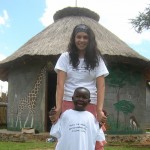 . Linens and mosquito nets are provided for each bed. Volunteers bathe from a basin in a shower room, and latrines are available for volunteers.
. Linens and mosquito nets are provided for each bed. Volunteers bathe from a basin in a shower room, and latrines are available for volunteers.
Meals
Meals are prepared by a cook and are eaten at the home of the Director.
Drinking Water
Volunteers are provided with water filters in their huts.
Electricity
There is electricity.
Internet Access
Volunteers can access the internet in Kitale, which is approximately 20 minutes away by Matatu (minivan/public transportation).
Laundry
Laundry is done for volunteers at no charge. All volunteers are asked to launder their own undergarments.
MEET THE DIRECTOR OF COMMON GROUND: JOSHUA MACHINGA
Reflections on Joshua’s childhood and family.
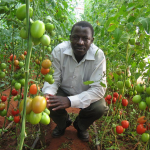
When I was young I watched my dad die of tonsillitis because my family lacked money to buy medicine or take him to the hospital. Life was hard after that. We used to have one meal a day, except harvesting seasons where we had two meals a day. I vowed to become an agronomist to help rural villagers to better their lives instead of seeking financial gains from the profession.
The challenges Joshua faced getting an education.
My desire to provide free education for needy children stems from the fact that my family was too poor to provide an opportunity for education. However, because of my good performance, I was always given the opportunity by my teachers to stay on when my colleagues went home for school fees. I did well in all my exams, scoring “A”s, and I was on top in Trans-Nzoia district twice but again lacked fees to proceed.
Luckily, I got the opportunity to return to school and proceeded to graduate with a certificate in GROW BIOINTENSIVE farming and a diploma in Community Development, Relief, and Social Worker. The opportunity to return to the school opened doors for me even before graduating. I had the opportunity to receive an award from President Daniel Toroitich Arap Moi of Kenya and Ali Hassan Mwinyi of Tanzania.
Currently, through Common Ground, I am supporting 56 orphans and vulnerable children in Kenya and Tanzania, giving them an opportunity to attend high school and or University/College and encouraging them to carry out community projects in their villages. Such projects include farming, waste management, poultry keeping, tree planting and renewable energy technologies.
What inspired Joshua to do the work and how he got started?
My work first arose from my desire to bring change in my family and community- changing from one- two meals a day to three meals a day, and seeing children attain a quality education. Talking about it is okay, but it is the doing something that really fuels my aspirations to do more.
Many families were hungry and there was no store within days of walking. They didn’t have money to buy food even if there had been a store. I had to do something. This led to the establishment of Common Ground.
What obstacles did Joshua face?
The project has had several success stories that can be replicated in other communities but we are limited in terms of sharing these success stories.
Demands for our services exceed our financial capacity. We are always struggling with widows, widowers, orphans and street children yearning for our support.
We also lack proper transportation for field workers, and for farmer-to-farmer exchange and educational visits.
What are the hopes for the future of Common Ground’s program?
We are hoping to make the organization self-sustaining by establishing income generation projects and endowment funds.
How has your partnership with Village Volunteers affected Common Ground’s work?
Through our partnership with Village Volunteers, Common Ground has been able to continue its effort for several years now. In fact, many of the program activities are going on today because of this partnership. We have seen our school enrollment and performance rise because of volunteers who contribute skills and finances.
Income of most villagers has more than tripled. Some villagers are earning more than what a graduate teacher earns in Kenya. In summary, we are impacting lives of thousands of women, men, and children in the region through education, food, health and conservation efforts.
How does your community benefit from having volunteers?
Volunteers serve in many capacities within our organization, by contributing time, energies or talents that help to fulfill the organizations’ mission. Volunteers generate enthusiasm and interest and help to create a positive image of the organization in the community. Volunteers extend and augment the work of paid staff. They focus on individual groups or subject areas and thus bring new insights, energy and time to the work.
Communities benefit from volunteers’ contribution because the services they provide helps individuals, families and the community address local needs and problems. Greater enthusiasm and rapport develops when volunteers share their enthusiasm for the work they are doing and the organization they are affiliated with. They often encourage others to become involved. Recognition of outstanding volunteers contributes to overall community pride.
Volunteers fulfill many roles at Common Ground. Generally, they fall into four categories: direct service, administrative support, fundraising, and leadership. However, individual activities vary greatly. They serve as teachers, tutors, mentors, doctors, chaplains, builders, and coaches. They organize events, participate in fundraisers, develop new resources, provide logistical support, assist with promotional events, and provide leadership and guidance. The roles volunteers fill are not only limited by the vision of the organization.
Additionally, many volunteers through Village Volunteers bring cultural awareness that assists in reaching untapped communities.
We are so grateful to Village Volunteers.
– Joshua Machinga Common Ground for Africa
Blogs written by Joshua Machinga
